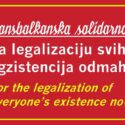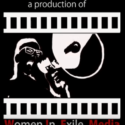Tag: health
-

COVID-19: No one is safe until All are protected!
Open Letter from the Transbalkan Solidarity Group Currently there are tens of thousands of refugees and other migrants in the Balkans. Some of them are accommodated in official collective centers, while a large number of people fall outside the system, surviving through the help of the local population and support provided to them by volunteers…
-

Testimonials from the uterus: Gesundheitsfürsorge für geflüchtete Frauen in Berlin und Brandenburg
released by Women in Exile Film about refugee women’s health issues
-
Building Bridges Festival 26.-29.07. 2019
Translation: AR | FR | FA | Women in Exile & Friends are planning a three day open air summer action camp in Berlin. The camp is for refugee women* (individuals and refugee women groups) and women* working with and for refugee women* issues. This camp will enable all of us to exchange on our experiences as refugee women* living in…
-
“Women Breaking Borders” Women* Conference organized by Women in Exile
This year refugee women are getting loud by organizing a national wide meeting on “Breaking Borders”. This was a decision reached during the evaluation meeting of the 2016 national wide summer bus tour of „women in Exile & Friends” and the network of refugee women and groups working with refugee women national wide. As women*…
-
Dramatic conditions at the emergency shelter (Notunterkunft) Osloer Straße 23-26 in Berlin
+++ deutsch unten +++ Living conditions in the emergency shelter of Osloer Straße 23-26, in Berlin, range from bad to worse. Those who live there in “transitory” manner denounce the sanitary situation and the permanent mistreatment of the employees working for the security company WISAG and BTB Bildungszentrum. These companies receive thousands of Euros per…